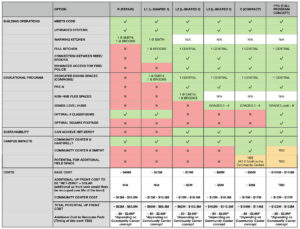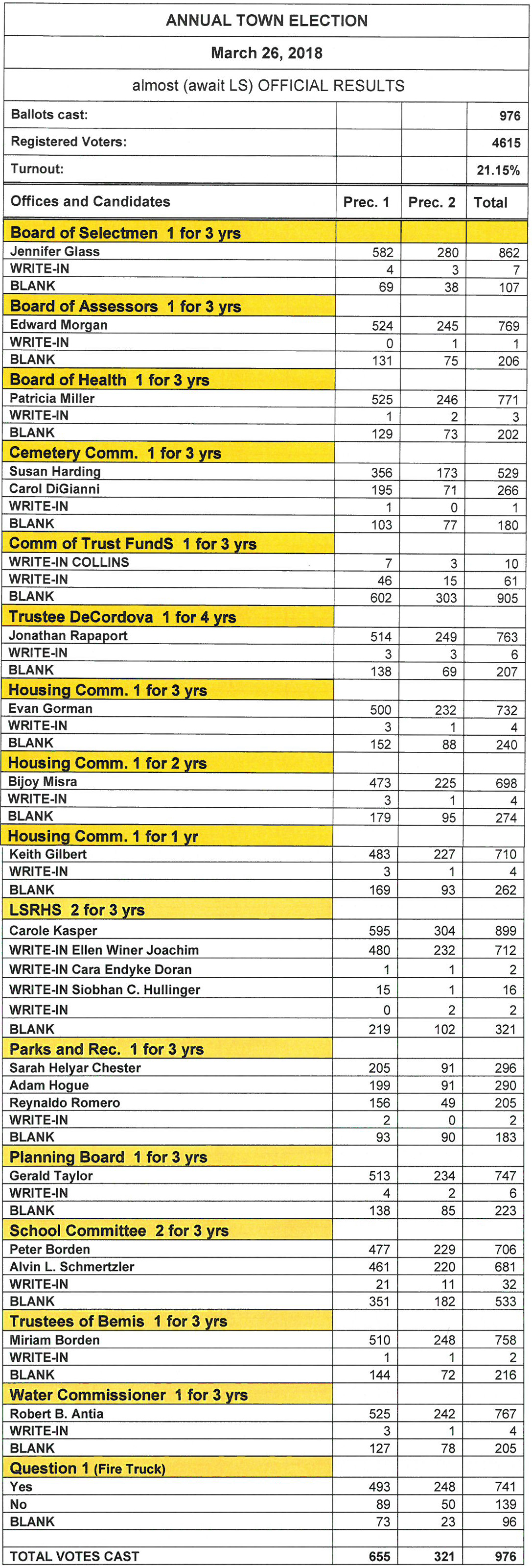
This School Building Committee chart compares the six options on features and cost and also shows total estimated campus costs that include the community center. (click to enlarge).
Residents who packed two workshops on April 10 on the campus building projects were asked for feedback on six school concepts and three community center schemes in preparation for votes at a Special Town Meeting on June 9.
At that meeting, voters will be asked to choose from among the three community center ideas and an as-yet-unknown number of school concepts, though it will be at least two. Firm cost estimates for each will be presented, and there will be two votes in the fall to bond the project. To win approval, Town Meeting must approve by a two-thirds majority; a simple majority is required at the polls.
The footprint, features and cost of the school concepts are described in this six-page summary, which also includes an energy performance analysis for all but one of the concepts, and the added cost to bring each concept into compliance with the “stretch” code (a higher level of energy efficiency than the state’s base building code) and net-zero energy use.
The paper version of the six-page concept summary handed out at Tuesday’s meeting also listed the annual tax bill increase for the median Lincoln taxpayers based on a 4 percent of 5 percent bond interest rates:
| School concept | Estimated cost | Annual tax increase (4% interest) | Annual tax increase (4% interest) | Added cost for stretch code compliance/net zero energy efficiency, including solar |
R | $49 million | $1,329 | $1,494 | N/A |
L1 | $73 million | $1,980 | $2,226 | N/A |
L2 | $79 million | $2,142 | $2,409 | $0 / $6 million |
L3 | $89 million | $2,413 | $2,714 | $0 / $6 million |
C | $95 million | $2,576 | $2,897 | $0 / $2 million |
FPC | $109 million | Analysis not yet performed for this option | Analysis not yet performed for this option | Analysis not yet performed for this option |
Superintendent of Schools Becky McFall outlined the educational advantages of each of the six options:
Option R
- There would be no educational improvement except for a more consistent temperature climate due to the heating system upgrade.
Option L1
- The new dining commons between the Brooks gym and auditorium lobby could serve as a learning space for large groups.
Option L2
- Bringing preK into the main school from Hartwell saves time for staff who serve both preK and K-8, as well as preK students who must sometimes cross the campus, and it also eases the integration of preK children into the school as well as faculty collaboration.
- Two new flexible-use spaces on each side of the school.
- Having a single, centrally located lower and middle school office and dining commons also reduces travel time for students and staff.
Option L3
- Hub spaces for grades 3-8 where classes can open out into larger collaboration or teaching spaces, and which allow more collaboration among teachers. At the new Hanscom Middle School, which includes hubs, “we find teachers are doing much more conscious planning together, and we see the impact of more integrated curricula being developed,” McFall said. For each grade, the hubs also “create a bit of a community within a community,” she added.
- A larger commons space than previous concepts, and the space looks out onto the woods, which is less distracting for students.
Option C
- Having two floors in part of the building reduces transition times for middle schoolers by shortening corridors. “The compactness helps with efficiencies and interactions for both faculty and students, as well as greater sustainability,” McFall said. “I feel like it’s a better design for education.”
- More space for playing fields
Option FPC
- Allows for the “optimal” educational program, with three more classrooms than the current school (or options L2, L3 and C), as well as hubs for all nine grades and more athletic field space.
- This option was recently added at the request of residents who wanted to see what an “ideal” building would look like, so the design is still in flux and it may be more compact building with two floors in some places, McFall said.
Almost every elementary school in Massachusetts designs within the past 10 years includes small breakout rooms and/or larger hub spaces between classrooms, McFall said. The U.S Department of Defense’s education arm, which oversees construction of schools on military bases, mandated this type of design for the Hanscom school. “They did a lot of research, and they’re convinced of it—their analysis shows a true benefit,” McFall said.
Having hubs and breakout rooms “is the catalyst to change… an eruptor that makes you think something else is possible,” said resident Jen Holleran. “This is a generational opportunity.”
The Capital Planning Committee is now researching long-term operating costs for the various options, which would include estimating the financial value of making a greater up-front investment in a more sustainable design, Finance Committee chair Andy Payne said. Any savings on current utility costs would not help pay down the bond but would show up in slower growth in the school’s annual operating costs, he said.
Following the presentation, residents were asked to specify their two favorite options to help the School Building Committee gauge how many concepts should be presented for a vote on June 9. In 2012, the SBC offered only one option for an up-or-down vote that failed to garner the required two-thirds majority, “and we will not make the same mistake—we feel like we have to bring that choice to you,” said Selectman and former SBC chair Jennifer Glass.
Community center
Workshop attendees then saw the three latest concepts for a community center located on the Hartwell side of campus and were asked for feedback on paper. (The fourth concept on the Community Center Preliminary Planning and Design Committee website—putting the facility in renovated Smith school space—is no longer being considered.)
All are 23,000 square feet and include renovation of any remaining standalone Hartwell pods. Scheme 3 calls for having the community center linked to all three pods, with a resulting total cost ($13.5 million to $16.5 million) lower than the estimate for the other two options (both $15 million to $18 million).
There will be a multi-board meeting to discuss more details of how to finance the campus projects on Monday, April 30.







